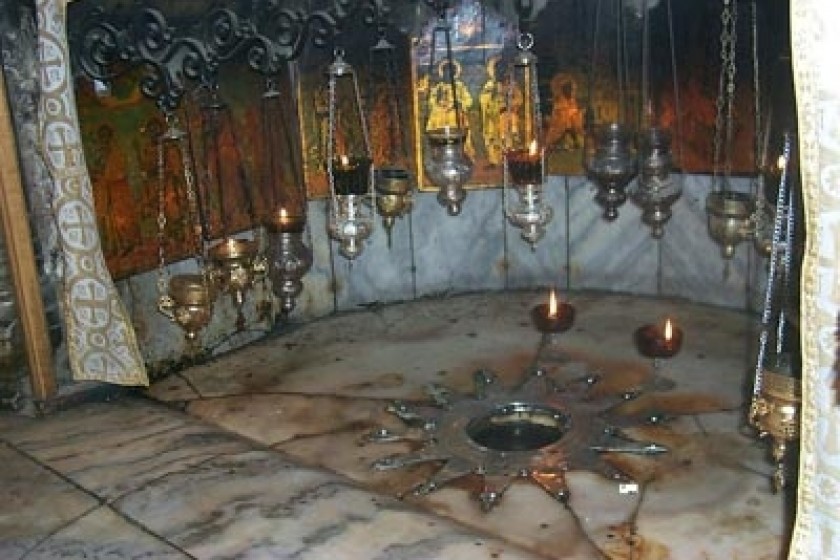
Palestinian Authorty Rethink Mollifies Armenians, Heralds Return to Status Quo
Arthur Hagopian
Jerusalem, Jan 6 - The Palestinian Authority (PA) in Bethlehem has had a rethink regarding its stance vis-a-vis the protocols in practice at the city's Nativity Church, rescinding a recent decision that had threatened to pit one Christian church against another.
The PA move, which comes after intense pressure, heralds the onset of a palpable peace between two brother churches, the Armenians and the Greek Orthodox.
The two have been embroiled in a territorial dispute in the church for years, arising out of what the Armenians claim is an attempt by the Greeks to encroach upon their traditional standing and position within the church.
The issue involves disagreement over the annual cleaning procedures, culminating in ugly brawls, that last year necessitated police intervention, and a PA edict Armenians saw as biased against them.
The Armenians accused the Greeks of breaching the tenets of the Status Quo of the Holy Places, a "fait accompli" which has ruled relations between churches and governments since the Ottoman era, and which spells out in minute detail the rights and privileges of the Christian churches in the Holy Land, as well as the manner and timing of celebrations of certain rites and ceremonies.
The three Guardians of the Holy Places (the Latin Custodia, the Greek Orthodox and the Armenian Orthodox churches), as well as the dozen other Christian denominations of the Holy Land, are bound by the tenets of the set of agreements thrashed out by the Ottoman Sultans with the aim of safeguarding Christian rights and avoiding internecine clashes.
Though rare, deviations from the Status Quo are viewed with concern and alarm.
The Armenians claim that in December 2007 the Greeks created facts on the ground by moving a ladder used to clean the walls of the church from its assigned place.
(To an impartial observer, the sweeping of a neighbor’s tile, or the movement of a ladder from one part of a wall to another, may seem trivial and no cause for resentment, but to the owner of the tile or wall, in the troubled Holy Land, the action is viewed as an unwarranted intrusion on its territorial rights).
In the event, in the spirit of brotherly feeling, they were ready to consider this a one-off, a temporary realignment with no provision for an encore.
But the Greeks thought otherwise and, according to the Armenians, wanted to enshroud the variation in the cleaning routine in a new status quo.
When the Armenians complained to the PA, the answer they received was simple and blunt: this is a matter between you and the Greeks to resolve.
Hanna Amireh, head of the PA's Presidential Committee for the Christian churches, declared that the "same arrangements which were reached last year are the most suitable arrangement for this year too.”
He warned that the decision of the Palestinian Authority “shall remain unchanged and the Armenians must submit to the Authority's decision,” warning it will “take all measures against those who dare to cause any kind of clash,” this correspondent was told.
Unfazed, the Armenians applied more pressure on the PA to reconsider, until the PA finally relented.
In a written pledge delivered to the Armenians earlier this week, the PA conceded 2012 would be the last time the Greeks would clean the church the new way, and that come December 2013, things would go back to what they were before and in accordance with the Status Quo.
To ensure nothing untoward occurred this year, the PA allowed the cleaning on January 2 to proceed under strict supervision, with a special police unit on standby outside the church, just in case.
"Both sides (Greeks and Armenians) were on their best behavior," a source close to the Armenian church said.
"When all is said and done, both churches share a common history and destiny. For instance, before the invention of the Armenian alphabet in 405 CE, Armenians wrote in Greek."
However, he confided that the Armenians still have pending issues "pertaining to our rights in the Nativity church."
Six months ago, one of the lamps that belong to the Armenians, located under the altar and on the Star of Bethlehem, dropped down along with the nail from which it hung, promptly spawning a new dispute with the Greeks.
Who had the right to put the lamp back up?
Once again, it would be up to the Palestinian Authority to find a way out of this potential minefield.
Pix: Star of Bethlehem
 Videos
Videos Photos
Photos




Write a comment